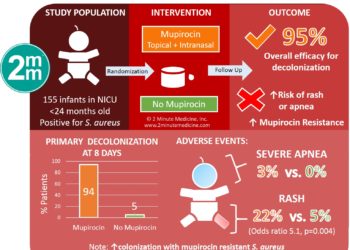Staph. aureus vaccine does not decrease postoperative infection rates
Image: PD
1. An investigational S. aureus vaccine, V710, was shown to not decrease incidence of postoperative infection in patients undergoing cardiothoracic surgery with median sternotomy.
2. Among patients with postoperative S. aureus infection, V710 vaccination is associated with increased rates of multiorgan failure and mortality.
Study Rundown: The median sternotomy serves as an integral part of many cardiothoracic surgeries including bypass grafts and open valve replacements. The median sternotomy poses the risk of postoperative infection, most commonly with the organism Staphylococcus aureus. Postoperative infection is usually treatable with perioperative antibiotics but serious S. aureus infections can be associated with case-fatality rates up to 50%. In this multi-center, international study, investigators examined the rate of postoperative S. aureus bacteremia and deep sternal wound infections with administration of the V710 vaccine versus placebo.
The authors of this study demonstrate that the V710 S. aureus vaccine, while increasing functional antibodies as expected, was not more efficacious than the placebo in reducing postoperative infection rates. Of greater concern, the vaccine was associated with increased rates of multi-organ failure and increased mortality in infected patients. Given these alarming findings, much more research is needed to investigate the interplay between humoral immunity and S. aureus infection in hopes of developing a vaccine or other mode of prevention.
Click to read the study, published today in JAMA
In Depth [randomized, double-blind, placebo-controlled study]: This randomized clinical trial evaluated 8,031 median sternotomy patients between December 2007 and August 2011. Patients were enrolled internationally from from 165 sites in 26 countries. Notably, the V710 vaccine induced a 1.9 fold increase in postoperative functional antibodies. However, significantly increased mortality was seen in S. aureus infected vaccine recipients as opposed to S. aureus infected placebo recipients (23.0 vs 4.2 per 100 person-years). Multiorgan failure was also seen more commonly in V710 recipients (0.9 events per 100 person-years) vs. placebo recipients (0.5 events per 100-person years).
By John Prendergass and Rif Rahman
More from this author: Eritoran does not decrease mortality during severe sepsis [The ACCESS Trial]. Protected sleep periods improve intern alertness and sleep duration, ADHD medication decreases rates of criminality in ADHD patients, Low dose aspirin shows net clinical benefit in patients with first unprovoked venous thromboembolism.
© 2013 2minutemedicine.com. All rights reserved. No works may be reproduced without written consent from 2minutemedicine.com. Disclaimer: We present factual information directly from peer reviewed medical journals. No post should be construed as medical advice and is not intended as such by the authors or by 2minutemedicine.com. PLEASE SEE A HEALTHCARE PROVIDER IN YOUR AREA IF YOU SEEK MEDICAL ADVICE OF ANY SORT. Content is produced in accordance with fair use copyrights solely and strictly for the purpose of teaching, news and criticism. No benefit, monetary or otherwise, is realized by any participants or the owner of this domain.







